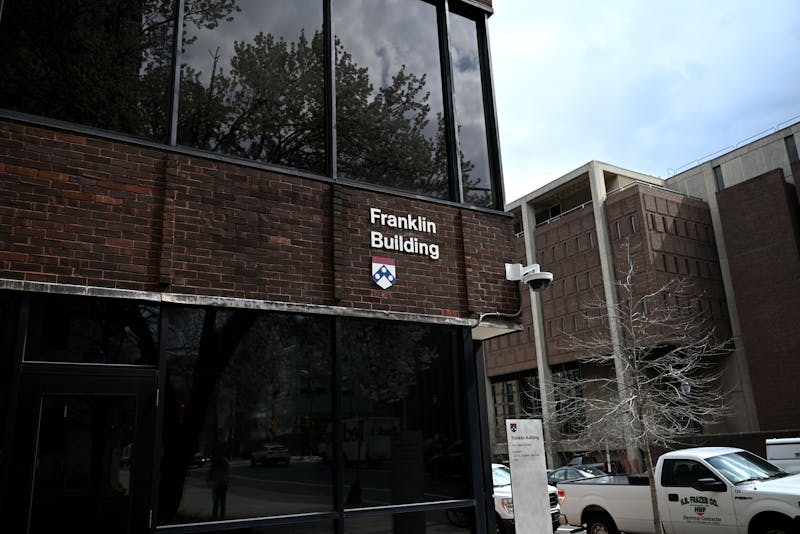
Life, liberty and the pursuit of happiness. And track? Running was in fact on the mind of one the founding fathers of this country -- Ben Franklin. In his Proposal for the Education of Youth, written for this fair university in 1749, Franklin wrote, "That to keep them in health and to strengthen and render active their bodies, they be frequently exercised in running, leaping, wrestling and swimming." Just as the discoverer of electricity wanted it, the Penn men's track program has developed into one of the best in the nation, producing Ivy League championships, top-ten worldwide times and Olympians. It is too bad few Penn community members recognize it. The track team is often left as second-day news despite having more consistent success than any other team in Penn history. Simply taking a tour of the traditional Penn facilities is like strolling through history, with images of track and field adorning the walls and filling the air with a sense of pride that is palpable to everyone who enters. Most importantly is Franklin Field, which Track and Field News Magazine named as the top track venue in the East. It is the site of the Penn Relays, the annual track and field carnival that brings the best of the best to West Philadelphia. "I know a father that said the two best days of his life were the birth of his children and his Penn Relays medal," Penn women's track assistant coach Tony Tenisci said. "Something like half or three-quarters of American track Olympians have run at the Penn Relays," according to Penn Relays Director Dave Johnson. Johnson's office in itself is almost a shrine to the past events at Franklin Field. While its disarray resembles that of a typical college dorm room, there is a strangely wise organization to it all. He leans back in his chair, overlooking the abyss of papers on his desk to see the collage of track icons on his walls and slips into a detailed history of the track program with the greatest of ease. It was as if it were his own history, which of course for a great part, it is. Penn had one of the first track teams in the country, which officially started in 1876 at the first Intercollegiate Championships. However, a group of rowers had been meeting and running two years prior. From this rowing practice sprang the track team. "We were the first group from Penn that competed against other schools," Penn men's track coach Charlie Powell said. "Track was the first Penn sport." Merely listening to Johnson recounting stories makes it clear that the development of the Relays and the Penn track program are virtually inseparable. "[Penn Relays] was created to revive interest in the track team," Johnson said. "And it certainly did just that." The Relays helped build the program into a powerhouse unlike anything the track world had seen before. Led by coach Mike Murphy, who split time between Penn and Yale, the Quakers won four intercollegiate championships and sent many athletes to the Olympic games. John B. Taylor, another one of Murphy's athletes, became the first African-American male to win an Olympic gold medal. Penn displayed its consistency by having a Quakers athlete at every Olympiad from 1900-1932. Johnson came to Penn in 1978, around the time when then-Relays director Jim Tuppeny was finishing his career as head coach of the men's track team. During his Penn coaching career, Tuppeny led the Quakers to an astounding nine Outdoor Heptagonals and Outdoor Ivy League titles in a ten-year period, putting the Red and Blue back on the track map for the first time since the early part of the 20th century. Athletic Department Compliance Coordinator Elton Cochran-Fikes, a middle-distance runner for the Quakers from 1970-1974, ran under Tupp. "For a ten-year period, Penn did not lose a dual meet in outdoor track and field," Cochran-Fikes said. "Recruitment was at a very high level." Cochran-Fikes is the school record holder in the 1,500-meter, 3,000m and mile runs. In his 20-year tenure as head coach, Powell has helped bring six Ivy League titles and four Outdoor Heptagonal Championships to Franklin Field. "We have been hiring really good people who have been able to maintain the program at a very high level," Cochran-Fikes said. "There continue to be Penn athletes who are performing at higher levels than they did when I was in school." Powell echoed his thoughts. "Especially when you have such a long history, you have to go above and beyond to even be able to mention yourself with some of the great names that have come through here," Powell said. "It's a great history and a tremendous tradition." The number of Penn athletes who scored qualifying times for this year's Intercollegiate 4A championships are too numerous to list. Co-captain Sam Burley currently has the top time for an American-born collegian in the 800 meter. Brian Abram continues to rewrite the Penn record books in many different categories. Junior Adam Chubb, who is known on campus as a center for the basketball team, is also an All-American high jumper, and finished 11th in the nation his freshman year at the NCAA championships. Though hardly anyone on Locust Walk would know this, Powell has actually gotten calls from agents, eager to know Chubb's future plans. This begs the question -- why do we not all recognize Abram when he walks down the street? Why does the track team not get an article recognizing the fact that about a dozen of its members are on their way to individual championship competitions? The only redeeming moment is the week of the Penn Relays, what Cochran-Fikes calls "the Super Bowl of track and field." "If you don't get excited about running the Penn Relays, you're in the wrong sport," Cochran-Fikes said. "I remember being at the Penn Relays and standing next to Bill Cosby, George Steinbrenner and Gen. Norman Schwarzkopf," Tenisci said. "I know only the Penn Relays could make that happen." Some suggest different reporting methods as a solution to the lack of knowledge of the historic track program at Penn. Others simply remark that it is just society in general favoring team sports at the moment. But no matter what, a good place for the Penn community to start would be at the Penn Relays. "I don't think the Penn community appreciates the jewel that the Penn Relays is," Cochran-Fikes said. "I think a lot of people see it as an intrusion on campus." This year the invasion of space begins on April 24th, and as always, Penn runners will surely make history. Just like Ben Franklin would have wanted.
The Daily Pennsylvanian is an independent, student-run newspaper. Please consider making a donation to support the coverage that shapes the University. Your generosity ensures a future of strong journalism at Penn.
DonatePlease note All comments are eligible for publication in The Daily Pennsylvanian.







